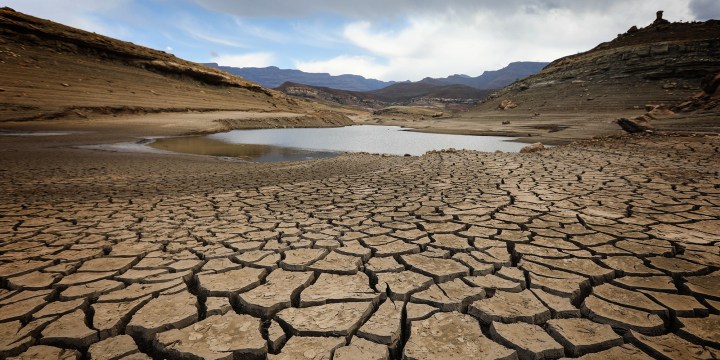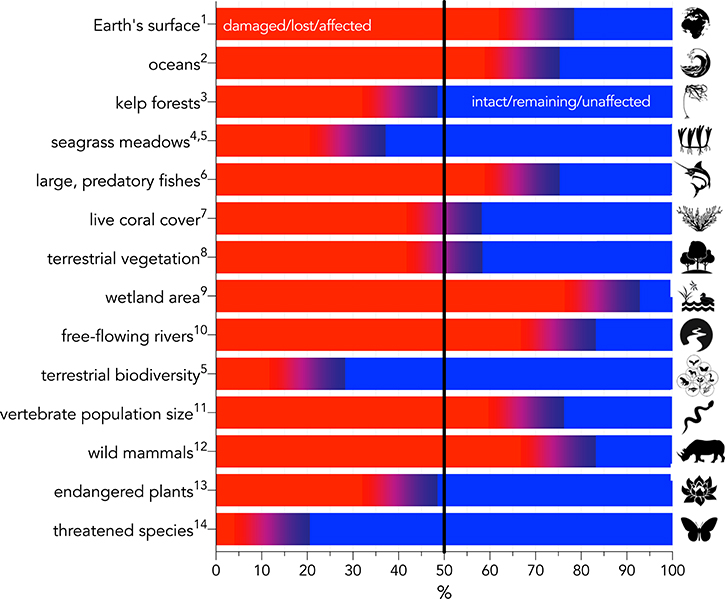SAVE OUR PLANET
Time to take off the climate crisis blinkers and accept that everything as we know it needs to change

At some point in reporting on the climate crisis it became received wisdom worldwide that we should dial back on gloom or you, the reader, will turn away and ignore the problem. Frankly, that’s insulting.
We need to tell it like it is: humanity is running an ecological Ponzi scheme in which we rob nature and future generations to pay for boosting incomes in the short term.
The fabric we call civilisation is in danger of unravelling faster than you might imagine and we’re being misled by bullshit. If we don’t stop now, we’re screwed.
The world stage upon which actors wring their hands in concern is a depressing show. Vastly expensive conferences like COP26 elicit empty promises to head to carbon-neutral, based on little more than hope. Polluting corporations embrace carbon credits that allow them to pollute and make empty promises about transitioning away from oil and coal.
Governments pay lip service to crisis preparation, but adopt a wait-and-see attitude. A little bit is gained in saving some species, a lot is lost elsewhere.
Through it all, humanity is causing a rapid loss of biodiversity and, with it, Earth’s ability to support complex life. Yet it’s difficult to grasp the magnitude of this loss, despite the steady erosion of the fabric of human civilisation.
The science underlying these issues is strong, but awareness is weak. It’s time to take stock. In comparison to rolling changes to planetary systems, Ukraine is a sideshow.
Since agriculture began 11,000 years ago, we have halved the biomass of Earth’s vegetation. Three-quarters of the planet’s large rivers no longer reach the sea. Of all the vertebrates (creatures with spines), 59% are our livestock, 36% are humans, and wild creatures are just 3%. We have lost around a third of all the large fish in the oceans.
In the past 500 years, more than 700 creatures and 600 plants have gone extinct and over a million species are at risk — and those are just the ones we know about. In the past 50 years, populations of non-domestic animals have dropped by 68% and 40% of all plants are considered at risk. We’re super-stressing the planet and heading for the sixth mass extinction. Take a look at this:

The problem isn’t so much that we pump out CO2, but that we do so while devastating the living systems — termed ecosystem services — that have the ability to sequester and neutralise it.
Stopping biodiversity loss is nowhere near the top of any country’s priorities, far behind other concerns such as employment, healthcare, economic growth or currency stability. Most of the nature-related United Nations Sustainable Development Goals are on track for failure. Even the World Economic Forum, which is often the captive of dangerous greenwashing propaganda, now recognises biodiversity loss as one of the top threats to the global economy.
What the Covid pandemic should have taught us is the danger of raiding ever-wilder areas for food, much of which is taking place in biodiversity hotspots where pathogen diversity is highest, but institutional capacity weakest.
Three quarters of new infectious diseases result from human-animal interactions, environmental degradation via climate change, deforestation, intensive farming, bushmeat hunting and an exploding trade in wildlife.
Meanwhile, the temperature keeps rising. Even assuming that all signatories to international climate treaties manage to ratify their commitments (a doubtful prospect), expected warming is still likely to reach 2.6-3.1°C by 2100 unless large, additional commitments are made and fulfilled. Without such commitments, the projected rise of Earth’s temperature will be catastrophic for biodiversity and humanity.
At great risk are the miombo woodlands of southern Africa, home to iconic animals such as elephants, lions, leopards, spotted hyenas, buffalo, antelope and giraffes. This vast area is becoming a less hospitable habitat. Rainfall is now more sporadic and intense, while the shifting climate threatens to increase wildfires that decimate wildlife.
According to Jeff Price, a climate scientist at the University of East Anglia who has studied the region, even a 1.5°C warming would make the area unsuitable for up to half of all species there.
This is playing out against another shift: the countries of the miombo are experiencing rapid population growth, contributing to the loss of the woodlands, which have shrunk by an estimated 30% since the 1980s.
This highlights the elephant in the room that keeps getting avoided in debates for fear of offending: overpopulation. A human is born somewhere on Earth every 45 seconds. Since the day I was born the world’s population has trebled. Much of the increase has been in Africa.
While the population of some countries has stopped growing or even declined, in sub-Saharan Africa the average is 4.8 children per woman. At this rate the population there will double every 30 years.
This is completely unsustainable on every level, not least because large populations and their continued growth are drivers of soil degradation and biodiversity loss. Population growth is also a factor in many social ills, from crowding, joblessness and migration to deteriorating infrastructure and bad governance.
Humanity’s consumption as a percentage of Earth’s regenerative capacity is about 170%. In other words, we’re consuming nearly twice what the planet can generate, with substantially greater consumption in the countries with the highest incomes.
There’s a reason for this and it has to do with our success as a species. The population of any species is governed by its food supply. This limited the number of humans on Earth until the 20th century. The massive population overshoot since the Industrial Revolution was largely enabled by the increasing use of fossil fuels. These convenient fuels allowed us to decouple human demand from simple biological regeneration.
Now every unit of food energy produced requires a multiple in fossil-fuel energy. This, coupled with the increasing consumption of carbon-intensive meat by the rising middle class has exploded the global carbon footprint of agriculture.
So what needs to change?
Everything as we know it. The gravity of the situation requires fundamental changes to global capitalism, education and equality, the abolition of perpetual economic growth, properly pricing the value added by nature, a rapid exit from fossil-fuel use, strict regulation of markets, reining in corporate lobbying and the empowerment of women.
This is going to entail difficult conversations about population growth and the shift to lower, but more equitable standards of living by wealthy countries.
Scientists, politicians and journalists need to avoid sugar-coating the overwhelming challenges ahead and tell it like it is. Anything else is misleading at best, or negligent and potentially lethal for the human enterprise at worst.
Did that scare you away from thinking about climate change? Of course not. I’m sure it just made you want to know how you can avoid being part of the problem and what actions you can personally take for us to move to a more sustainable future.
The issue may be complex, but the solutions are not out of reach. We the people, and not governments or corporations, are the force that needs to steer civilisation on to the road to a sustainable future, as the young Swedish activist Greta Thunberg constantly reminds us.
It’s essential and doable, so here’s a checklist. Back in 1971, community activist Saul Alinsky developed guidelines for ordinary people to make change happen. They’re still good to go:
-
- Power is not only what you have but what the enemy thinks you have.
- Never go outside the expertise of your people.
- Whenever possible go outside the expertise of the enemy.
- Make the enemy live up to its own book of rules.
- Ridicule is your most potent weapon. There’s no defence. It is almost impossible to counterattack ridicule. Also, it infuriates the opposition, who then react to your advantage.
- A good tactic is one your people enjoy.
- A tactic that drags on too long becomes a drag.
- Keep the pressure on.
- The threat is usually more terrifying than the thing itself.
- The major premise for tactics is the development of operations that will maintain constant pressure upon the opposition.
- If you push a negative too hard it will break through into its counter-side. This is based on the principle that every positive has its negative.
- The price of a successful attack is a constructive alternative.
- Pick the target, freeze it, personalise it and polarise it. When all else fails, dig shit.
We can all be Greta Thunberg if we want to. All it took her was a sign in the right place at the right time and a stubborn streak. The result that rippled outwards was a global butterfly effect. DM/OBP
[hearken id=”daily-maverick/9317″]





















Don, a human is born roughly every half second, that is equivalent to our entire 60m RSA population added to the world every year. Perhaps your 45 seconds was intended to be every 0.45s?
I agree with you Don – we need to be honest and direct about what is happening. And yes, overpopulation is a central part of the equation. However, Alinsky’s checklist is not particularly helpful. We need something a little simpler than that, but I will remember ridicule!